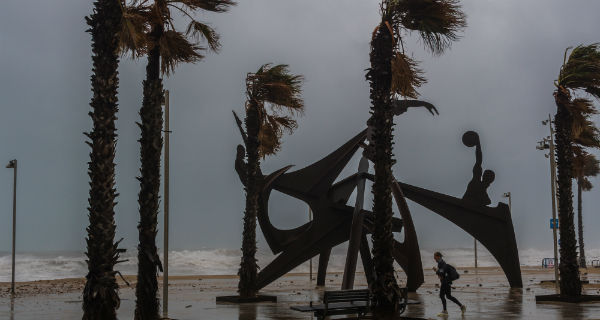Barcelona is currently experiencing significant disruptions as severe flooding has forced the cancellation of multiple flights at El Prat Airport. The flooding has caused chaos in the city, leading to a state of red alert across the region.
Efforts to manage the crisis are ongoing, with authorities urging residents and travellers to remain cautious and updated. Floodwaters have overwhelmed parts of the airport and city infrastructure, affecting thousands of people.
Flooding Leads to Massive Flight Disruptions
The city of Barcelona has been plunged into chaos as severe flooding has led to the cancellation and delay of more than 80 flights. The inundation has impacted El Prat Airport, Spain’s second-largest airport, causing significant travel disruptions. A red alert has been issued due to continuous torrential rains in the region, adding to the city’s woes.
In response to the flooding, Spain’s state meteorological agency has placed Catalonia, including Barcelona, on red alert. This measure indicates the severity of the weather conditions, with warnings of potential hazards due to the heavy rains. The airport authorities have advised passengers to monitor public transport options, as bus, metro, and commuter lines are experiencing delays due to the ongoing storms.
Impact on Local Transportation and Infrastructure
Local media have broadcasted visuals of the extreme weather conditions, including cars partially submerged on highways. The flooding has not only disrupted air travel but has also severely impacted local transportation networks. Rail services have been suspended to ensure passenger safety, compounding the difficulties faced by commuters.
Moreover, the flooding extends beyond Barcelona, with significant impacts observed in Valencia. Here, local authorities have extended travel restrictions for an additional two days to support emergency services. This decision aims to facilitate continued rescue and relief efforts amid the widespread devastation.
Response from Authorities and Support Initiatives
Authorities have been scrambling to address the crisis, deploying rescue teams to assist those trapped by the floodwaters. These efforts come after recent floods in Valencia resulted in numerous casualties, underscoring the urgent need for intervention.
To aid those affected, the Tui Care Foundation launched a fundraising appeal. This initiative follows the destruction caused by the flooding, aiming to provide relief to communities in both Barcelona and other affected regions.
In addition, Intrepid Travel’s non-profit wing, which had previously initiated a Spain Flood Appeal, has raised almost $22,000 since its inception last Friday. Both appeals aim to offer critical support to those grappling with the aftermath of these severe weather events.
Meteorological Conditions and Forecast
The severe weather responsible for this crisis is attributed to ongoing meteorological activities across the region. Experts suggest that such intense storms could become more frequent, hinting at changing climate patterns that may expose European cities to increased flooding risks.
Forecasts predict continued rains over the next few days, exacerbating the existing conditions. Consequently, residents and travellers are being urged to remain vigilant and keep abreast of the latest weather updates. Emergency services remain on high alert to respond promptly to any emerging situations.
International and Tourism Implications
The flooding in Barcelona has caught international attention, posing significant implications for the tourism sector. The timing is particularly challenging, as it coincides with peak season periods where tourist footfall is generally high.
Major tourism stakeholders are assessing the situation closely, with some travel operators adjusting itineraries to ensure traveller safety. The disruption highlights the vulnerability of destinations to unexpected natural events, stressing the need for robust contingency planning.
Social Media and Public Reaction
Social media platforms have been inundated with reactions from locals and travellers alike. Many have taken to Twitter and Instagram to share experiences and express concerns about the current situation.
These platforms have become crucial communication tools, offering real-time updates and safety information. Users have posted videos and photographs showcasing the extent of the flooding, illustrating the urgency and severity of the situation faced by Barcelona and its residents.
Public sympathy and solidarity have been evident, with users across the globe extending support and expressing hopes for swift relief efforts.
The Broader Impact on Spain
While Barcelona bears the brunt of this disaster, neighbouring regions like Valencia are also grappling with the flood’s aftermath. The crisis has sparked national conversations about emergency preparedness and climate resilience.
The widespread impact of these weather events is prompting discussions among policymakers, who are considering long-term solutions to mitigate similar occurrences in the future. This situation serves as a stark reminder of the ever-present threats posed by climate change, pushing the need for sustainable development and infrastructural investment.
Looking Forward
As recovery efforts continue, attention is shifting towards rebuilding and restoring normalcy. Authorities are working tirelessly to reopen affected transport hubs and restore essential services as quickly as possible.
The floods in Barcelona have underscored the importance of resilience against natural calamities, prompting calls for improved disaster management strategies. Efforts are being geared towards providing the necessary resources to help communities recover from the damage inflicted by this environmental catastrophe.
Final Thoughts
The recent flooding in Barcelona is a stark reminder of the vulnerabilities cities face in the face of extreme weather. As the city and surrounding regions begin the long path to recovery, the importance of preparedness and robust response strategies cannot be overstated.
Severe flooding in Barcelona poses substantial challenges for both locals and travellers. Efficient management and support are essential for recovery.

